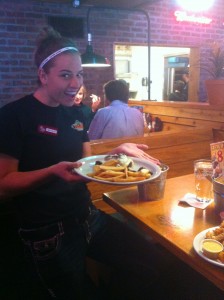Cami Weldon eats out frequently, but she said she often receives poor service. Servers ignore her and make her wait a long time for food. Weldon, a graphic design major from Riverton, said she often wonders why servers give college students the short straw when it comes to great service.
Service plays a role in some students’ likelihood to return to restaurants, while others debate that poor service is not a contributor in eating out.
Brielle Porter, a secondary education major from St. George, is a server at Olive Garden. She said the reason why college students might receive bad service is their socioeconomic status.

“Servers often stereotype college students and think they will not give a good tip,” Porter said. “Because of that, the server won’t give good service.”
Natalie Soelberg, a dental hygiene major from Idaho Falls, goes to UVU and has been a server at Texas Roadhouse for nine months. She said service isn’t important to customers returning to the restaurant.
“Regardless of how good the service is, they’ll come back if they like the food,” she said. “When people talk about a restaurant, they don’t say, ‘That restaurant has great service,’ they say, ‘That restaurant has great food.’”
Joseph Neary, a Middle Eastern and Arabic studies major from Paradise, said good food is always more important than good service.
“I don’t see service as an indicator of good food,” he said. “Sometimes servers have bad days, and good food is always worth the wait.”
Others believe dining out isn’t always about eating.
Christie Cerenzie, a nursing major from San Diego, Calif., said she believes service is what makes the difference between eating a meal and dining out.
“Service overrides food,” she said. “You can get food anywhere. Places that stick out in your mind are the ones where people and the environment are extraordinary.”
Dave Ferrell, a BYU grad from Pueblo, Colo., said circumstances might dictate whether food or service is more important.
“People eat for different reasons,” he said. “I’m an experiential person, so every experience I go through is very important. If either one (service or food) isn’t there, the experience is a failure.”
Ferrell said bad service might be a part of the experience.
“A grumpy waitress might contribute to the authenticity and the experience at the restaurant,” he said. “Maybe it’s a really old-school diner and it’s the end of the day. You might expect the service to be poor.”




